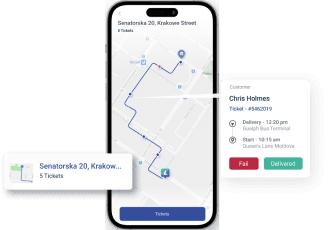TABLE OF CONTENTS

Sign-Up
Enter your email address
Open-Source VS Commercial: Which One is the Best GPS Tracking Software?
GPS tracking software is required for a variety of tasks. This may include fleet management, asset tracking, and personal safety. The IT industry is always growing. The global positioning system (GPS) technology is expected to be worth more than USD 2.9 billion in 2022. It will keep going up at a rate of more than 12.5% per year until 2032. With the help of new satellites and systems, GPS signals are becoming more reliable, accurate, and accessible. GPS is being mixed with technologies like virtual reality (VR), artificial intelligence (AI), and the Internet of Things (IOT). This combination of new technologies will help solve problems that affect people worldwide.
There is a lot of competition in the wide-ranging market for GPS tracking software. It offers both free and paid software. Open-source companies like Traccar and OpenGTS are two of the biggest names in the business. These companies offer free and customizable software solutions. Commercial companies like Fleet Complete and Verizon Connect provide paid software. These programs are reliable, full of features, and come with dedicated support and services. Let us discuss both open-source and commercial GPS tracking systems in detail.

What is GPS and How Does It Work?
The Global Positioning System (GPS) is a satellite-based navigation system that transmits signals from satellites to GPS trackers. These trackers determine the user's location by using satellite coordinates. GPS technology works around the clock to find out the speed, location, distance, track, and direction of people or things that have GPS devices.
The GPS system is owned and operated by the US Department of Defense. It is available throughout the world. The GPS constellation is comprised of 31 satellites that are evenly spaced and maintain a continuous orbit around the Earth. They provide geographic location information to ground receivers. The location accuracy of the majority of equipment ranges from 100 to 10 meters. The military-approved equipment is accurate up to one meter.

The GPS system consists of 21 GPS satellites and three spare satellites. These satellites are orbiting about 10,600 miles above the Earth. Each satellite is equipped with a computer, an atomic clock, and a radio. These systems broadcast its changing position and time.
A GPS receiver on the ground has a computer inside. It gets directions from three satellites and triangulates its position to within 100 meters. If the receiver gets signals from the fourth satellite, it can figure out its location and altitude.
Open-Source GPS Tracking Software
Open source is a way of making computer programs that is based on working together as a community. Any software is built around its source code. It is usually covered by a license and cannot be shared with anyone else. Users of open source software can examine, improve, and change the code. This promotes openness, better testing, and the communication of ideas. This process makes software better over time. The goal of this method is to make code better over time so that everyone can benefit. Just like other technologies, open-source GPS trackers have advantages and disadvantages.
Open-source GPS tracking software offers several advantages. These include scalability, compatibility with multiple devices, strong system assistance, and accurate tracking. Scalable GPS systems are easy to set up for tracking a small number of objects. So, businesses do not lose money when they have to make big system upgrades. They are compatible with a wide variety of GPS tracking devices. Customers can use this software with devices that are already in use. It results in significant cost savings.
But open source software is not perfect for every kind of use. Its disadvantages include limited official support and the requirement of technical expertise. It is possible that contributors will not always do good work. So open-source software might not be as good or reliable as paid options.
Commercial GPS Tracking Software
Commercial GPS trackers are made by specific companies and they own their source. These companies sell only services to customers. Customers cannot edit or modify the source code of commercial software. If a customer needs an update or encounters a bug, he has to contact the software owner for these problems.
GPS tracker software has two special features. One is active and the other is passive GPS tracking. Active tracking sends data to a central database through a modem. Passive tracking just keeps track of where the vehicle is at all times. It tracks where things are and stores information about trips based on events. If you need to track something in real time and respond right away, then active GPS systems are a better choice.
The commercial GPS tracking software also has some advantages and disadvantages. These programs are more accurately designed and backed by professionals. Also, these softwares owners provides better customer support and more features as compared to pen source software. But these are very expensive programs. Small or medium business owners cannot afford commercial software.
Comparing Commercial and Open-Source GPS Tracking Software
Users have to make a key choice between commercial and open-source software when choosing the perfect GPS tracking solution. Each option has its own set of benefits and drawbacks. Their services meet specific needs and abilities. Here are some of the key points to compare before making the final decision:
Cost Effectiveness
The primary advantage of open source software is its low or nonexistent price tag. Still, you should think about the hidden costs like support and customization. Commercial software is usually worth the extra money because it comes with more features and better customer service.
Availability of Source Code
Open-source GPS tracking software, like Traccar's GitHub repository, lets users see, change, and share the source code. Commercial GPS tracking programs like GPS Trace and Wialon maintain the original owner's source code and are patent and license-protected.
Software Evolution
Open-source GPS tracking systems are usually made by volunteers. So anyone can help improve the software and give it support. New ideas and technologies are added to these solutions over time. Companies offering professional services and customer care create commercial options that let businesses use and keep an eye on GPS tracking data directly.
Security and Privacy
Open source software makes security practices clear, so the community can do full audits. Commercial software is usually safe, but it depends on the vendor's promises and is less clear.
Lumyri GPS Tracking System
Lumyri is an advanced GPS tracking software with a range of features. It offers live tracking, accurate reporting, route optimization, and geo-location services on an easy-to-use interface. The software is highly customizable, so users can create reports that are customized to meet their specific business needs. Several sectors can benefit from Lumyri's GPS tracking solution, including distribution, logistics, healthcare, and agriculture. If you need a perfect GPS tracking solution for your business, contact us right now.
Click here to get in-depth insights about Lumyri GPS Tracking Solutions
Conclusion
The selection of the most effective GPS tracking software is a matter of individual preference. The open-source options are cheaper but you may not be able to get all the features or support you need. Commercial software costs much more than free software. But it offers better features, easier-to-use interfaces, and dedicated support. Businesses that know a lot about technology can do well with open-source solutions. On the other hand, businesses that want software that is easy to use and has lots of features should choose commercial software. To find the best GPS tracking device for your needs, you should think about your budget, your technical knowledge, and the features you want.

Aiden mitchell
As a GPS Tech geek, I find Lumyri's transformative impact on GPS technology on businesses and their customers. Real-time tracking information empowers businesses to provide accurate delivery estimates, allowing customers to plan their schedules with precision.


